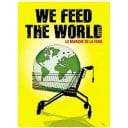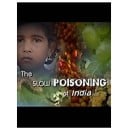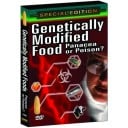
We Feed The World
 Every day in Vienna the amount of unsold bread sent back to be disposed of is enough to supply Austria's second-largest city, Graz. Around 350,000 hectares of agricultural land, above all in Latin America, are dedicated to the cultivation of soybeans to feed Austria's livestock while one quarter of the local population starves. Every European eats ten kilograms a year of artificially irrigated greenhouse vegetables from southern Spain, with water shortages the result.
Every day in Vienna the amount of unsold bread sent back to be disposed of is enough to supply Austria's second-largest city, Graz. Around 350,000 hectares of agricultural land, above all in Latin America, are dedicated to the cultivation of soybeans to feed Austria's livestock while one quarter of the local population starves. Every European eats ten kilograms a year of artificially irrigated greenhouse vegetables from southern Spain, with water shortages the result.
In We Feed The World, Austrian filmmaker Erwin Wagenhofer traces the origins of the food we eat. His journey takes him to France, Spain, Romania, Switzerland, Brazil and back to Austria. Leading us through the film is an interview with Jean Ziegler, the United Nations Special Rapporteur on the Right to Food.
We Feed The World is a film about food and globalisation, fishermen and farmers, long-distance lorry drivers and high-powered corporate executives, the flow of goods and cash flow–a film about scarcity amid plenty. With its unforgettable images, the film provides insight into the production of our food and answers the question what world hunger has to do with us.
Interviewed are not only fishermen, farmers, agronomists, biologists and the UN's Jean Ziegler, but also the director of production at Pioneer, the world's largest seed company, as well as Peter Brabeck, Chairman and CEO of Nestlé International, the largest food company in the world. (Excerpt from we-feed-the-world.at)




Any websites you guys recommend, from where I can download this documentary and other such
i am 63 years old , during my life i saw the food world is changing dramatically. when i was a child all vegetable`s and fruits taste really great and in time it went to taste like plastic. and statistics said that GM foods and seeds is the king.
the world become so greedy for technology and toys that makes values of the past seem lost.
the economic grow is the king that destroy our globe.
it iiis time to go back asap to basic value`s , for living we need really very few basic thing`s. happiness is our nature and compete over redicuolos things like fancy housingcarsand toys is really not necesary.
but i am sure that nothing will stop the global train for Armagedon.
destroy the globe!!!!!!!!!!!!!!!!!!!!!!!!!!!!!!!!!!!
Anyone else keep expecting black goop to ooze out of the CEO's forehead in the end like with Gary Oldman in the Fifth Element. "Oh, hey could you wait a second, my cosmic evil overlord intent on the destruction of all life is calling."
Agriculture is an Art of Life, to live with the land gives the only understanding of the value of its produce. Working on the land is a product on its own that brings inner and outer harmony and a sense of health! These Romanian workers have something that most of us have lost. It is sad that the man could not put more words to what he observed...they seem happy... he said.
A farm is an extension of ones own soul life, the soil resembles ones soul...
Many have shown us in the past and some are teaching us today how we can become open with our senses to taste, feel, hear, see and experience the need to connect to the earth, to connect to the year and to connect to ourselves. Farming is the therapy highly needed for the future. From Rudolf Steiner to Anastasia, from head to heart, we are bringing a new movement that will give people what they have been looking for for so long.. a link to the natural world around us.
Excellent documentary!... really enjoyed the wide range of people interviewed who were connected in some way to food production, from all parts of the world.....very informative , not too heavy handed , but harsh enough to make the viewer question the value of the food we eat ..... a must see!
maybe my eyes are just bad, but I found it very difficult to read some of the text on the video. When it go to full screen mode it's very distorted and unreadable. Any idea where a person could find a better quality version of this or a version with voice over rather than subtitled? Looks interesting, but after about 4 minutes I gave up on trying to decifer it...
Any seed that REQUIRES pesticides from the SAME CORPORATION will corrupt and destroy us. Why? because Absolute power, corrupts absolutely.
It is Man vs Nature. The more we control nature, most the time the better. But, in the end Nature is in control and if we forget that and think Man can control nature, we are to doom ourselves.
But, to ease the mind, for me. I always think... Man is in NO better position to survive better than an ant or fruit fly. Sure the ant has no idea of asteroids and such... but man is flawed in thinking 80,000 years to the nearest NON planet bearing star is a future that is realistic is doomed.
Our sun will burn up, or better still the atmosphere will be destroyed, BY the very technology that made us live longer in the SHORT TERM.
So, as you can see Man and Ant are in the same boat. Our egos try to tell us otherwise, that we are somehow superior and will live on Mars or something if Earth becomes unbearable.
Ants and Men have equal chance of long term survival because we are biological.
In fact I would go as far as to say the Ant will be around millions of years after Man has destroyed the air, water and soil. But, in the end the Ant is extinct when asteroids or the sun burns out... so again Man and Ant are in the same boat. That boat leads to death. This is OK as it is Nature that dictates this.
Love your life now and make the most of it... don't worry so much my friends.
The head of the Nestle lies to his teeth, saying no one has ever caught an illness from GMO foods. Can he show even one research that hasn't been funded by some big corporation that hasn't got ties to GMO, one less biased research? Saying organig is not the best is an even bigger lie. It is better in every terms except maybe from the stock market's point of view, and that's only because companies that produce synthetic foods have the upper hand at the moment. GMO production does require less workers per amount of land used than your organic farming, but it yields less harvest per land used than organic. And by organic I mean permaculturally farmed foods, that's the most organic way available today if I'm not mistaken. And notice that I said it requires more work(ers) to collect the harvest; yet it does not require any machines for farming itself. It's a different matter how you handle food transport.
Of course Nestle chief says it's better to sell water than to let everybody have it as their right. They make profit while polluting and draining ground water. Texas or some other US state that had recently a drought, a dry season, Nestle just keeps draining their ground waters too. You know what they use that ground water for? To bottled water which is then sold in markets, and researchers have found mercury in those bottles. Their excessive use of ground water deprives citizens in those areas of their public water and causes erosions, since where ground water once was, is now just an empty hole. Irresponsible theft of resources approved by the money and morally corrupt justice system.
So Nestle has 4,5 million people they hold as slaves by having them addicted to money and keeping valuable knowledge of how to make their living without submitting themselves to a big corporation like that, out of their hands. One piece of this valuable knowledge is permaculture. All you need is some time to read a book of it or go to a teacher if you find one, and a piece of land to farm. Then a forest will grow back and animals may rejoice of your work, if you're succesful... or rather, when. If you don't poison nor deprave nature, it will take back it's own anyways. Permaculture is just a way to speed that process up and select which species grow there, naturally. It also has the power to end world hunger, should hungry people with usable land learn it and use it. And they have, for thousands of years. Permaculture is just a new word for it, and it has been proven to work both by today's research and farmers and by those who practised those kind of methods in the past. And on top of all, it's much healthier food than your nutritionless carbohydrates, sugars, synthetic fats and all processed food. The book Gaia's Garden for example, is an excellent piece to get started. Whether you live in desert, wetland or raped land, it'll eventually work. Apart from the harvest and getting started for the first time, it require very little work too.
Work... Nestle chief talks like you need it in order to live. That may be true, but not the kind of work he has in mind. Being one's own master seems to be a strange idea these days, but I feel it's a most welcome one. Where is the point in sweating blood all day and polluting nature and destroying your health if you have another way?
Sorry for the long post and an advertising speech, but what can we do if we do not have alternatives? Here's just one.
What the CEO fails to mention is the fact that GM foods are not traced - therefore, how can you possibly know whether anyone has died from allergic reactions to GM? GM companies lobby the government to make sure there are no labeling or tracing laws - even though surveys show the people DO want GM foods labeled.
And eating food is not like smoking. Not everyone smokes, but everyone has to eat. So the fact that food is so ubiquitous in our everyday lives, makes it even harder to trace - say GM peanuts in your peanut butter made you sick - if it's not labeled GM, how would anyone know?
And here's another sad fact the CEO tries to glorify as the truth - cost of living has gone up, so has inflation, so has household debt all around the world but particularly the US, no wonder people want cheap chicken to eat - they have barely enough after paying all the bills. Now BOTH parents have to work in order to pay off a mortgage whereas in the past just the father working would suffice. The farmer at the beginning was right, he needs to produce far more food to make a living than his father did before him. That's saying something! GDP of a country may go up, but it is not a representation of QUALITY of life of its people.
People may live longer now, but people are also sicker than ever, cancer rates have shot up to 1 in 2, obesity is on the rise in every Westernized country and yet in third world countries, we still haven't eradicated hunger - even though all these live aid concerts raised millions of dollars (where have they gone I wonder?)
So before you swallow the tripe coming out of the CEO mouth, think of this, he has a master to serve, and that master is his corporation. It has no heart, no soul and yet it has right bestowed upon it, as though it is a human being with the same rights as we do - minus the social & environmental responsibilities. And the core objective of the corporation is profit - nothing else, because without it, it ceases to exist. So the CEO will say anything and everything to preserve that profitability, even if it means lying through his teeth.
And forget about the hogwash about Nestle being responsible for giving jobs. If Nestle never existed, do you think these people would be out of work forever? If there's a void, other companies would spring up. Some people would start their own businesses, some would've gone into another industry. The bit I like best was the end, where the CEO pointed to the video of a Japanese factory running on robots. I can see where he wants Nestle to head into the future - automation - where you don't even need that many workers anymore. All to be replaced by robots. Actions speak louder than words Mr CEO.
This documentary actually made me cry, I have always known that we are doing horrible things to the world, but what it shows you at the end, while describing all the inequalities is that this evil race, the so called humans have all but a little of humanity. I believe in progress, but I will never understand how we, people of the rich countries can just look ahead and continue with our meaningless lives while our own kids, the kids of our world, the so called hope and future are dying, starving at the eyes of the cameras of CNN and BBC, to show them with flies on their eyes and their skin around the bones showing the extreme malnutrition. I believe in the good side of many people, I don’t think that the race should erased from the surface of the earth but I think it’s time recognize that we’re nothing else than monsters. Thanks Mr. Wagenhofer for reminding us that, while we will keep killing the world and letting our people dye, we’ll just go to Mcdonalds to take a BigMac with french fries and a Coke, and will keep being the pigs we are.
Personally I find it... I'm missing a good word for this, horrifyng maybe, to think that people have to drink polluted water while some CEO talks about giving water a price.
Furthermore if you imagine that we throw away food while people are starving and in the whole process destroy our planet just to produce more food that we can't consume at all isn't that just ironic?
I'm happy to have such a good life but I feel bad for those who suffer just so that I'm able to live that way.
The actual truth here is, as I believe, that we live in a cycle that can go one way or the other. The Nestlé CEO for example tells us that they provide jobs, on the other hand a corporation will always want to max out their profit thus using technology that replaces human workers. And you can not fill those spots with people who produce or maintain them. If there is a way to make profit with water, they will find and use it, same goes for seeds that can be used only one time and have to be bought again but then for a higher price if the government won't subsidize them anymore.
Why don't hey use the old seeds then? Because people won't buy them, they are tricked by the price and the way a fruit looks, no matter the taste.
Well you have heard that yourself, I don't have to make a summary here.
I guess I will see the products I buy in a different way now when I'm shopping.
Sincerley,
F. N.
I know the CEO at the end was supposed to be some kind of Dr Evil type representation, but I really ended up agreeing with about 95% of what he said.
An interesting documentary. No narrative whatsoever. It simply gives you a look at different elements within the global food producing machine from a casual observer's Point of View.
I quite like this hands off approach, since it is very neutral. It does not take one's side over the other. It simply allows some of those concerned to speak their point of view.
To me, it feels much more powerful, since at the end of the documentary, the filmmaker gets his/hers point of view across by allowing us, the viewer, to naturally reach our conclusion.
Highly recommended.
BT